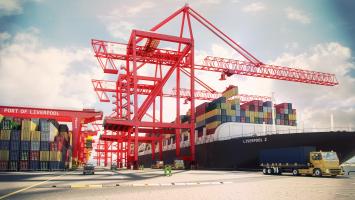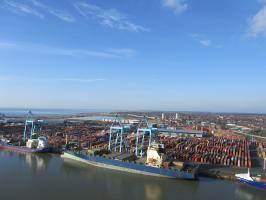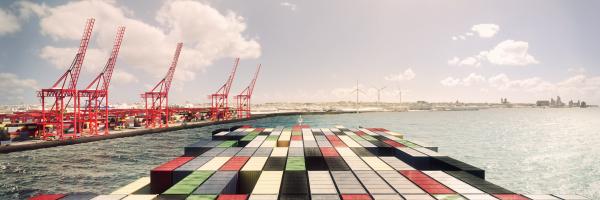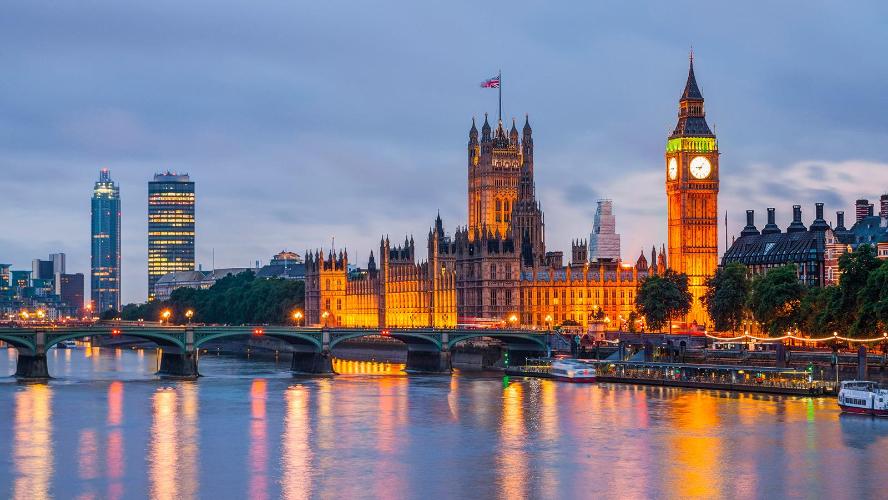EIB supports Liverpool port expansion
A vital organ in the economy of North West England, the Port of Liverpool is undergoing a major expansion to accommodate larger container ships and lure trade from the congested southeast. Supported by a EUR 185 million loan (GBP 150 million), the new terminal will open for business this year, providing shippers and lines with a direct route to the heart of the UK.
“Some 90 percent of containers coming into the UK come through the Southeast, but 60 percent are destined for or originate in the north of the country or Ireland. Using Liverpool will reduce cost and eliminate congestion,” said Gary Hodgson, Chief Operating Officer of the Peel Ports Group, one of the country’s largest port operators, which owns the Liverpool facility. 20 000 tonnes of steel will go into the making of a quay wall which will measure an impressive 850 metres in length and hold a volume of 3 million cubic metres.
Built in the early 1970s, Liverpool’s container terminal is today restricted in the size of vessels it can handle. The largest ships currently calling at Liverpool have a capacity of 3 500 to 4 500 TEU (Twenty foot Equivalent Unit - the measurement used to size out container ships). In line with market trends, the GBP 300 million deep-water container terminal, Liverpool2, will bring the world’s largest container vessels back to the UK’s most central gateway, which links Liverpool with markets in the Americas, India, Far East, Caribbean, Mediterranean and the Baltics. This will make it more efficient and cost-effective for importers and exporters to movie goods in and out of the Midlands, the north of England, Scotland, Ireland and Northern Ireland, while at the same time doubling the port’s container capacity by 1 million TEU.
The investments at the Port of Liverpool will drive jobs and deliver international trade to the very centre of the UK – representing a huge opportunity to fuel the concept of a Northern Powerhouse and help to rebalance the UK economy.
A major port for trade with the West
Liverpool is the UK’s major gateway for trade with the United States and Canada and serves more than 100 destinations. It handles a mix of chemicals, coal, steel products, grain and other Agri-bulks. In the past two years, companies including Kellogg’s, Princes, and Tesco, have begun or increased shipments through the port. Liverpool is also the major UK port for trade with Ireland, handling more than 40% of all unitised freight crossing the Irish Sea, plus nearly three quarters of a million passengers, and is also a growing port for cruise ship calls.
Five shipping lines currently call at Liverpool on their routes to North America and Canada: Orient Overseas Container Lines (OOCL) and Hapag Lloyd have made Liverpool the sole UK port of call for their service to Canada and have two ships a week calling at the Royal Sea-forth Container Terminal; Mediterranean Shipping Company (MSC) contributes ships to the service which calls at Liverpool, Antwerp, Bremerhaven, Le Havre and Montreal; the French container line CMA CGM slot charters on the service, whilst Atlantic Container Line (ACL) and Independent Container Line (ICL) connect services in the USA with Liverpool as their first and last port of call.
A boom to the local economy with respect to the environment
Mr Hodgson is very confident that this expansion project will be the largest boost to employment since the development of the Liverpool One city centre retail complex: “There is no doubt that this facility represents a transformational project for the business. It will bring jobs and economic prosperity to the Merseyside region along with the rest of the North West.”
For the EIB as well as for Peel Ports Group, expanding the port and respecting the environment go hand in hand. A full Environmental Impact Assessment has been undertaken for the project, including environmental impact studies and a public consultation.
Liverpool will also connect directly to a number of port centric logistics hubs along the Manchester Ship Canal via vessel – resulting in the development of the UK’s first sustainable “green water highway” reducing costs, congestion and carbon footprint for businesses located in its hinterland serving the north of the UK. This will allow global shippers to access the UK’s major import centres via the most economic and lowest carbon route and provide northern-based importers and exporters with a more competitive route to market.




